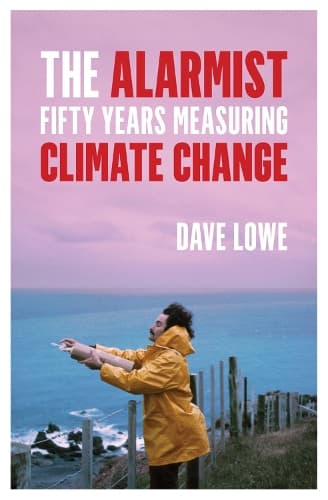Review: The Alarmist: Fifty Years Measuring Climate Change
Reviewed by Jim Eagles
As the title suggests, Dave Lowe is a New Zealand scientist who 50 years ago started taking the first measurements of atmospheric carbon dioxide in the southern hemisphere, thus demonstrating that climate change is a global problem.
So you might expect this to be an account of his climate change research, probably followed by a growing concern at the implications, then a rising anger as the “alarmist” message is undermined by vested interests and largely ignored by those in power, and finally a clarion call for action. All that is indeed there. But so much more as well.
For a start there is the uplifting story of Dave Lowe himself. Being small and quiet, he describes his secondary schooling as “a hellish experience” where he was bullied from day one and learned next to nothing from the mostly uncaring teachers. As soon as he reached 15, the legal age for leaving school, he took a job making cups of tea and cleaning equipment at the Post Office. It was a “boring filthy job” where he read comics in his spare time “but no one picked on me”.
However, working at the Post Office did allow him to go surfing where he could feel at one with the weather and the waves. He also got to know a primary school teacher, the father of a school mate, who encouraged him to read books and introduced the wonders of the local library. Soon Lowe was reading books about surfing, the weather, waves, the environment, physics, mathematics, engineering and more.
Before long he knew that he wanted to spend his life studying these wonders but to do that he had to pass the University Entrance examination. In spite of opposition on all sides, Lowe went back to school, where the teachers were not keen on a pupil with broken schooling, but he thrived and came top in physics. At university he prospered further, earned a good degree, joined the old Department of Scientific and Industrial Research, got the chance to do ground-breaking research, gained a PhD in Germany and earned a share of the 2007 Nobel Peace Prize as one of the lead authors on the report of the Intergovernmental Panel on Climate Change. Not bad for a high school drop-out.
Along the way we also get to enjoy accounts of him using what we like to think of as typical Kiwi ingenuity to conduct innovative experiments on the cheap: something well-illustrated by the cover photo of a young Lowe standing on the exposed edge of Wellington’s Baring Head in the teeth of a howling gale to collect samples of air fresh from the Southern Ocean.
There’s a fascinating cast of characters, too: a few narrow-minded administrators and colleagues with their own agendas who considered climate research unimportant and a lot of dedicated scientists around the world seeking to find out what is happening to Earth’s climate.
Thankfully for the lay reader the book is not weighed down with the academic detail of climate science but it does contain enough data to clearly illustrate the issue. For instance, the tests Lowe made his name with show that when he was born in 1946 the atmosphere contained just 310 parts per million of carbon dioxide; when he took his first air samples in 1972 it was up to 330ppm; it is now at 410ppm.
To those who argue it’s nothing to worry about he gently suggests that soaring temperatures, raging bush fires, melting ice sheets and rising sea levels do rather indicate we’ve got a problem.
Needless to say, the book does end with a call to action. But, typically for the man we have come to know through its pages, its focus is not on grand global policies – though he insists they are needed - but on how ordinary individuals can play their part. Lowe and wife Irene practice what they preach by walking to the shops, buying an electric car but still using public transport where possible, planting a garden and climate-proofing their cottage.
So, what’s his prognosis? Although deeply pessimistic about the moral courage of politicians, he is hugely encouraged by the way young people are demanding action and especially by New Zealand’s success in calling on a team of five million to beat the Covid-19 pandemic. Now, he says, “humanity must call on a global team of eight billion to tackle climate emissions, starting now.”
This is an inspiring book. And a great read.
Reviewed by Jim Eagles
